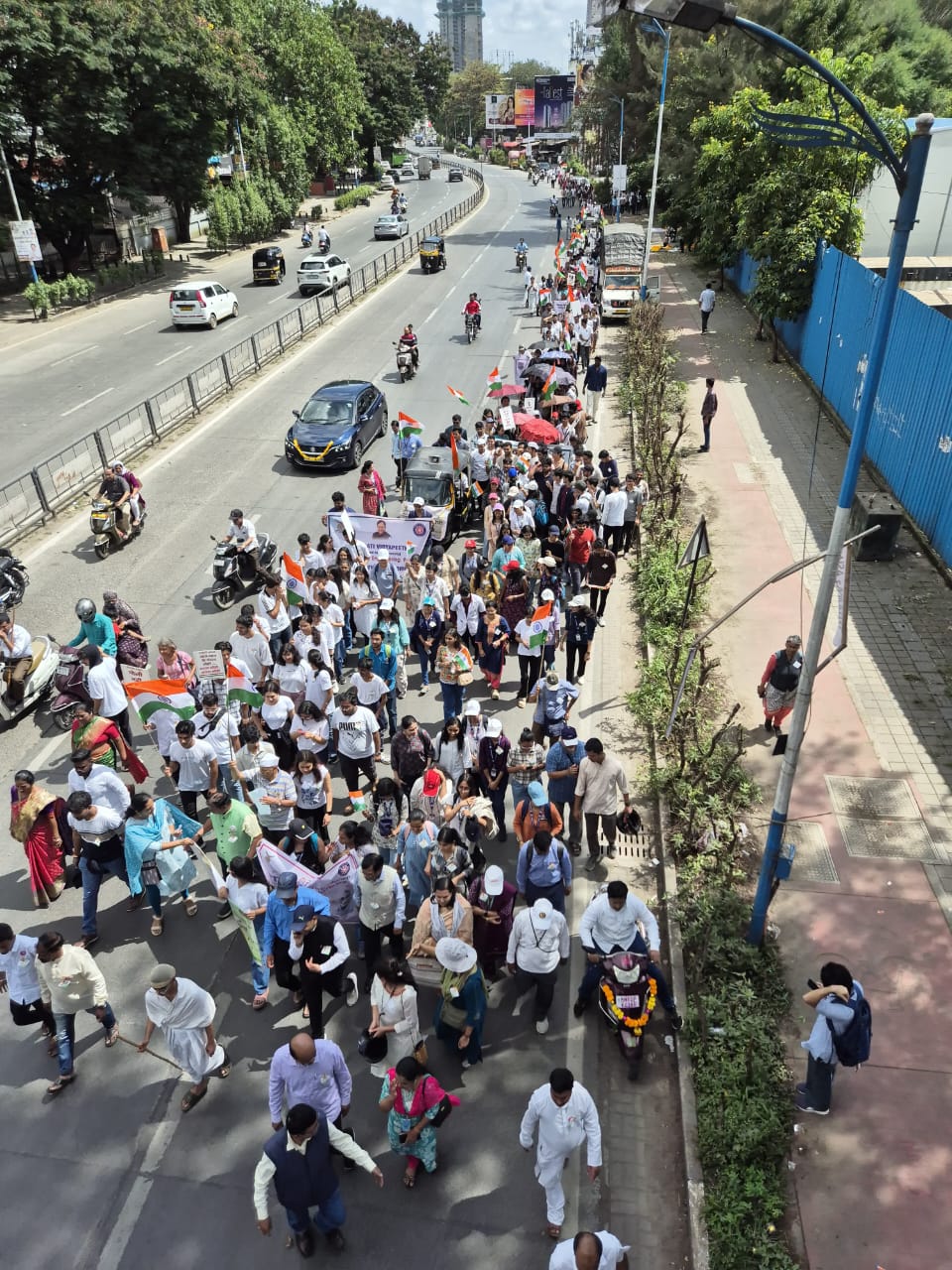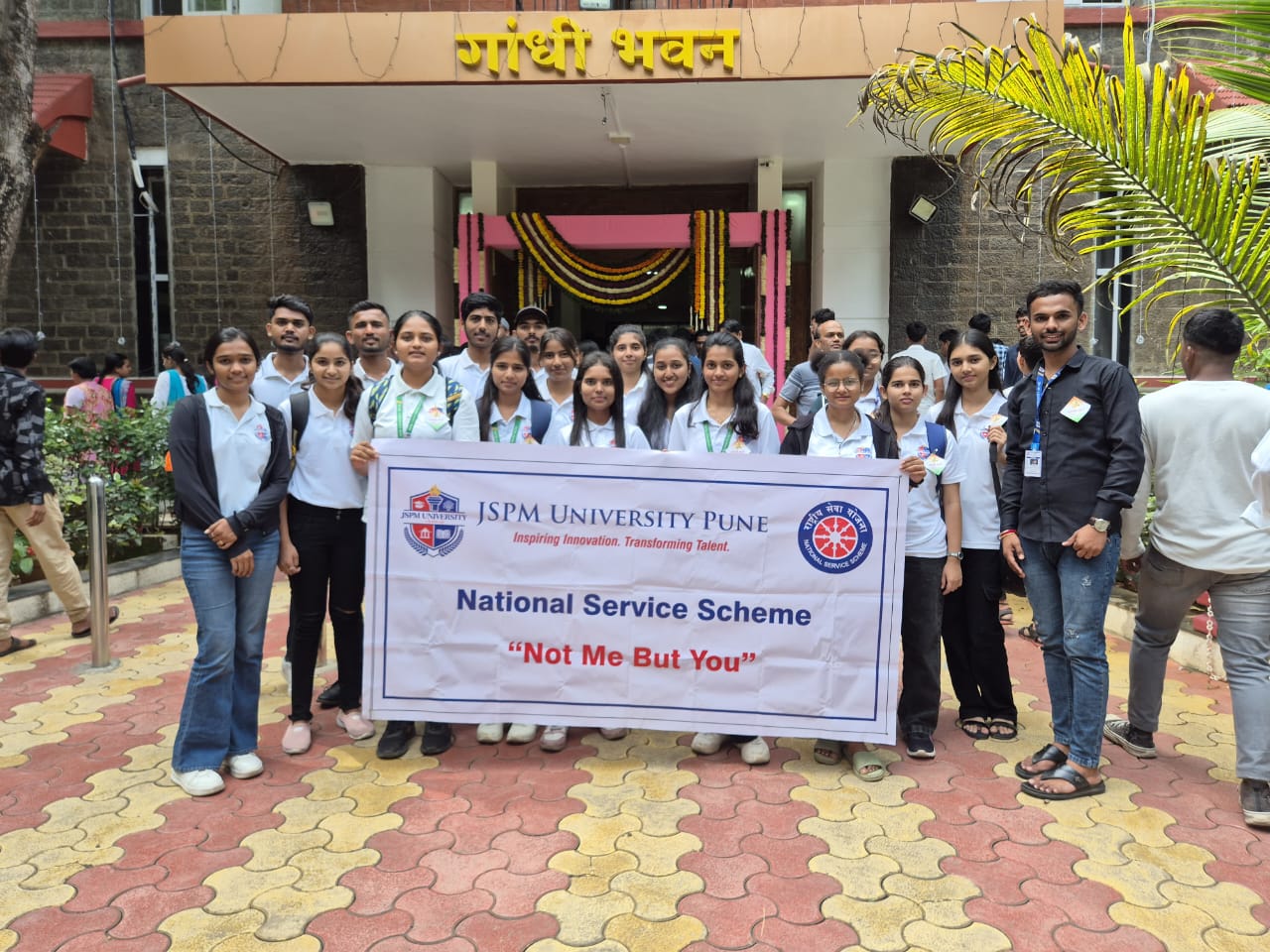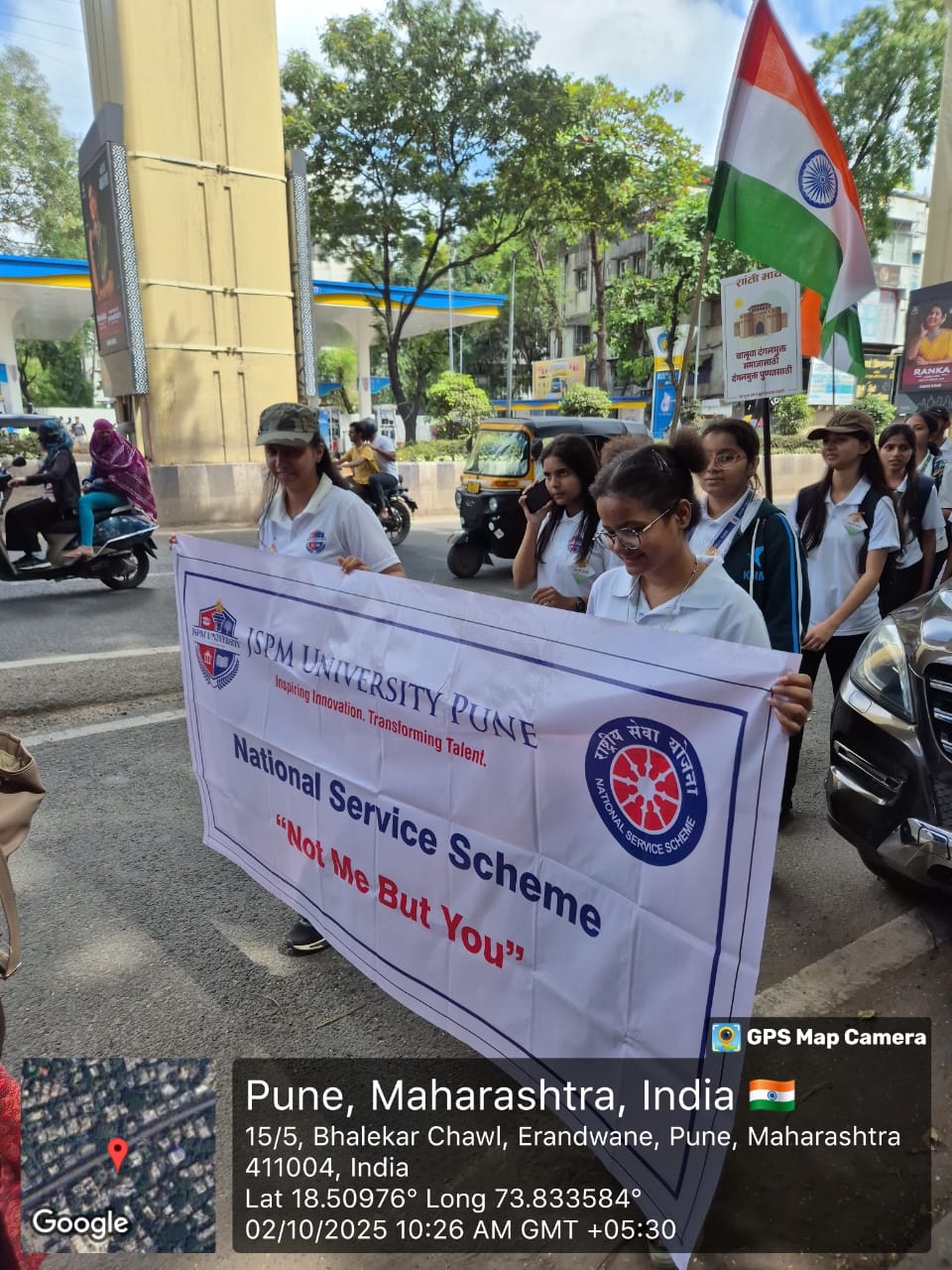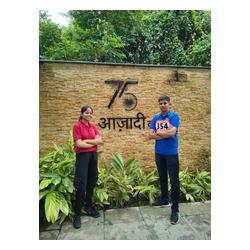NSS JSPM University
Introduction:
In India, the idea of involving students in the task of national service dates back to the times of Mahatma Gandhi, the father of the nation. The central theme which he tried to impress upon his student audience time and again, was that they should always keep before them, their social responsibility. The first duty of the students should be, not to treat their period of study as one of the opportunities for indulgence in intellectual luxury, but for preparing themselves for final dedication in the service of those who provided the sinews of the nation with the national goods & services so essential to society. Advising them to form a living contact with the community in whose midst their institution is located, he suggested that instead of undertaking academic research about economic and social disability, the students should do "something positive so that the life of the villagers might be raised to a higher material and moral level".
The post-independence era was marked by an urge for introducing social service for students, both as a measure of educational reform and as a means to improve the quality of educated manpower. The University Grants Commission headed by Dr. Radhakrishnan recommended introduction of national service in the academic institutions on a voluntary basis with a view to developing healthy contacts between the students and teachers on the one hand and establishing a constructive linkage between the campus and the community on the other hand.
The idea was again considered by the Central Advisory Board of Education (CABE) at its meeting held in January, 1950. After examining the various aspects of the matter and in the light of experience of other countries in this field, the Board recommended that students should devote some time to manual work on a voluntary basis and that the teachers should also associate with them in such work. In the draft First Five Year Plan adopted by the Government of India in 1952, the need for social and labour service for students for one year was further stressed. Consequent upon this, labour and social service camps, campus work projects, village apprenticeship scheme etc. were put into operation by various educational institutions, In 1958, the then Prime Minister Pandit Jawaharlal Nehru in his letter to the Chief-Ministers, mooted the idea of having social service as a prerequisite for graduation. He further directed the Ministry of Education to formulate a suitable scheme for introduction of national service into the academic institutions.
In 1959, a draft outline of the scheme was placed before the Education Minister's Conference. The Conference was unanimous about the urgent need for trying out a workable scheme for national service. In view of the fact that education as it was imparted in schools and colleges, left something to be desired and it was necessary to supplement it with programmes which would arouse interest the social and economic reconstruction of the country. It was viewed that if the objectives of the scheme were to be realized, it was essential to integrate social service with the educational process as early as possible. The Conference suggested the appointment of a committee to work out details of the proposed pilot project. In pursuance of these recommendations, a National Service Committee was appointed under the Chairmanship of Dr. C.D. Deshmukh on August 28, 1959 to make concrete suggestions in this direction. The committee recommended that national service for a period of nine months to a year may be made compulsory for all students completing high school education and intending to enroll themselves in a college or a university. The scheme was to include some military training, social service, manual labour and general education. The recommendations of the Committee could not be accepted because of its financial implications and difficulties in implementation.
In 1960, at the instance of the Government of India, Prof. K.G. Saiyidain studied national service by students implemented in several countries of the world and submitted his report under the title "National Service for the Youth" to the Government with a number of recommendations as to what could be done in India to develop a feasible scheme of social service by students. It was also recommended that social service camps should be open to students as well as non-students within the prescribed age group for better inter-relationship.
The Education Commission headed by Dr. D.S. Kothari (1964-66) recommended that students at all' stages of education should be associated with some form of social service. This was taken into account by the State Education Minister during their conference in April 1967 and they recommended that at the university stage, students could be permitted to join the National Cadet Corps (NCC) which was already in existence on a voluntary basis and an alternative to this could be offered to them in the form of a new programme called the National Service Scheme (NSS). Promising sportsmen, however, should be exempted from both and allowed to join another scheme called the National Sports Organisation (NSO), in view of the need to give priority to the development of sports and athletics.
The Vice-Chancellors' Conference in September, 1969 welcomed this recommendation and suggested that a special committee of Vice Chancellors could be set up to examine this question in detail. In the statement of national policy on education of the Government of India, it was laid down that work experience and national service should be an integral part of education. In May, 1969, a conference of the students' representatives of the universities and institutions of higher learning convened by the Ministry of Education and the University Grants Commission also unanimously declared 'that national service could be a powerful instrument for national integration. It could be used to introduce urban students to rural life. Projects of permanent value could also be undertaken as a symbol of the contribution of the student community to the progress and upliftment of the nation.
The details were soon worked out and the Planning Commission sanctioned an outlay budget of Rs. 5 crores for National Service Scheme (NSS) during the. Fourth Five Year Plan. It was stipulated that the NSS programme should be started as a pilot project in selected institutions and universities.
On September 24, 1969, the then Union Education Minister Dr. V.K.R.V. Rao, launched the NSS programme in 37 universities covering all States and simultaneously requested the Chief Ministers of States for their cooperation and help. It was appropriate that the programme was started during the Gandhi Centenary Year as it was Gandhi Ji who inspired the Indian youth to participate in the movement for India’s independence and the social upliftment of the downtrodden masses of our nation.
The cardinal principle of the programme is that it is organised by the students themselves and both students and teachers through their combined participation in social service, get a sense of involvement in the tasks of national development. Besides, the students, particularly, obtain work experience which might help them to find avenues of self-employment or employment in any organisation at the end of their university career. The initial financial arrangements provided for an expenditure of Rs. 120/- per NSS student per annum to be shared by the Central and the State Governments in the ratio of 7:5 i.e. the Central Government spending Rs. 70/- and State Governments Rs. 50/- respectively per NSS student per year. An amount of Rs. 120/- per NSS student per annum on programmes to be shared by the Central and State Governments in the ration of 7:5 (i.e. Rs. 70/- per student by the central government and Rs. 50/- per student by the State Governments). Now, the NSS is a Central Sector Scheme of Government of India and to run its activities & Programmes in all the States and Union Territories are fully funded by the Central Government. Keeping the inflation in view, the budget for Special Camping and Regular Activities is as follows:
- Regular Activities: Rs.400/- per volunteer, per annum.
- Special Camping Programme: Rs.700/- per volunteer, for two consecutive years.
The scheme now extends to all the states/Union Territories and universities in the country and covers Councils of +2 level in the country also in many states. Students, teachers, guardians, persons in authority in government, universities and colleges/schools and the people in general now realize the need and significance of NSS. It has aroused among the student youth an awareness of the realities of life, a better understanding and appreciation of the problems of the people. NSS is, thus, a concrete attempt in making campus relevant to the needs of the community. There are several instances of excellent work and exemplary conduct of NSS units which have earned them appreciation respect and confidence of the people. The special camping programmes organised under the themes of 'Youth Against Famine (1973)', 'Youth Against Dirt & Disease (1974-75)', 'Youth for Eco-Development' and "Youth for Rural Reconstruction' 'Youth for National Development and Youth for Literacy (1985-93)' 'Youth for National Integration and Communal Harmony (1993-95)' have resulted in gains both to the community as well as to the students. The theme for the year 1995-96 onwards for Special Camping is Youth for Sustainable Development with focus on Watershed Management and Water land Development'. Themes have been selected in accordance with national priorities. Also, from 1991-92 onwards NSS has launched a nationwide campaign on AIDS Awareness called "Universities Talk AIDS" (UTA) which has earned international attention and appreciation.
Community service rendered by university and +2 level students has covered several aspects like adoption of villages & Urban slums for intensive development work, carrying out the medico-social surveys, setting up of medical centres, programmes of mass immunization, sanitation drives, adult education programmes for the weaker sections of the community, blood donation, helping patients in hospitals, helping inmates of orphanages and the physically handicapped etc. NSS volunteers rendered commendable relief work during natural calamities/emergencies such as cyclones, floods, famine, earthquake, tsunamis etc from time to time all over the country. The NSS students have also done useful work in organising campaigns for eradication of social evils, and popularization of the nationally accepted objectives like nationalism, democracy, secularism, social harmony and development of scientific temper.
At JSPM University, the National Service Scheme (NSS) plays a vital role in shaping socially responsible citizens by empowering students through service, leadership, and community engagement. Our NSS unit strives to cultivate values of dedication, empathy, and teamwork among students while contributing to the holistic development of society.
Volunteer Strength
The NSS unit at JSPM University comprises 100 active student volunteers who are enthusiastically engaged in a wide range of activities, from social awareness campaigns to community service projects. Their energy and commitment reflect the spirit of youth-led nation-building.
Program Officers
A team of 11 dedicated program officers ensures effective planning, coordination, and smooth execution of all NSS initiatives. Their mentorship enables students to actively participate and make meaningful contributions.
Leadership and Guidance
The NSS activities at JSPM University are conducted under the able leadership of:
- Hon'ble Vice Chancellor, Dr. B. B. Ahuja– Chairman, guiding and motivating NSS initiatives with his visionary leadership.
- Vishal Choudhari, Registrar– Vice Chairman, providing strong administrative support and ensuring effective functioning.
- Mahesh Lokhande, Program Coordinator– Coordinator, facilitating and streamlining NSS activities across the university.
Through its structured leadership, strong volunteer base, and dedicated officers, NSS at JSPM University continues to instill the values of social responsibility, discipline, and community development among students. Our motto remains clear – “Not Me, But You”, reflecting our commitment to serving society selflessly.
The National Service Scheme (NSS) at JSPM University actively engages students in impactful initiatives that combine social service, environmental awareness, civic responsibility, and cultural values. These activities foster leadership, discipline, and a strong sense of service among the youth, aligning with the university’s vision of nurturing socially responsible citizens.
- NSS Launch & Social Service
- Formal inauguration of the NSS Cell, marking the beginning of structured service activities.
- Organization of blood donation campstwice a year (September and March), promoting the spirit of humanity and community well-being.
- Cleanliness & Environment
- Cleanliness drivesacross the university campus and at historical sites like Sinhagad Fort, encouraging environmental consciousness.
- River and fort cleanliness drives, fostering ecological care and sustainable practices.
- Awareness & Civic Engagement
- Gandhi Jayanti rally and pledge, spreading Gandhian values of peace, non-violence, and truth.
- Constitution Day celebrationscoupled with an AIDS awareness quiz, sensitizing students towards civic duties and public health.
- Community & Culture
- Traffic management and road safety drives, enhancing public discipline and awareness.
- Old Age Home visits, cultivating empathy and intergenerational bonding.
- Shiv Jayanti Padayatra and cultural events, celebrating heritage, patriotism, and cultural pride.
Through these diverse activities, NSS at JSPM University continues to instill responsibility, leadership, and a spirit of service among students, preparing them to contribute meaningfully to society.
At JSPM University, the National Service Scheme (NSS) is guided by a vision of creating stronger, skilled, and socially responsible youth. Our approach combines clear participation criteria with forward-looking plans that expand opportunities for service, learning, and leadership.
Membership Criteria
- A minimum of two years of active NSS membershipis required for students.
Service & Conduct Criteria
- Volunteers must complete 120 hours of serviceand attend at least one special camp.
- Consistent participation, dedication, and good conduct are essential for recognition.
Future Plans – Expansion & Thematic Drives
- Expansion of the volunteer base to engage more students in community development.
- Special emphasis on health, environment, and democracy-related activities, addressing pressing social challenges.
Future Plans – Skills & Culture
- Organizing workshops on leadership, disaster management, and traffic safety, enhancing student capabilities.
- Promoting cultural and heritage celebrations to instill pride, values, and inclusivity.
By setting strong criteria and ambitious future plans, NSS at JSPM University ensures that students not only serve society but also develop the skills and values necessary to become responsible leaders of tomorrow.
At JSPM University Pune, we believe in nurturing socially responsible citizens through the National Service Scheme (NSS). NSS provides students an opportunity to serve society with dedication and compassion while building character, leadership qualities, and a sense of responsibility for a better tomorrow.
Enrollment for A.Y. 2025–26 is now open with 40 seats available for new NSS volunteers.
Steps to Join NSS:
- Enrollment Availability– 30 seats open for new volunteers.
- Collect Form– Obtain the NSS Enrollment Form from your Program Officer.
- Fill Details– Enter personal, academic, and contact details carefully.
- Submit Form– Return the completed form to the Program Officer for verification.
- Interview Process– Attend the scheduled interview and await shortlisting.
- Confirmation & Commitment– Shortlisted students must commit to 120 hours of service and pay a nominal ₹50/- registration fee.
Join NSS at JSPM University Pune to serve society, gain leadership skills, and create meaningful impact.
Shanti March Rally on the occasion of Mahatma Gandhi Jayanti.
JSPM University Pune Pre-Republic Day Parade at RTM University Nagpur

Apply Now
 +91 20 6733 5100
+91 20 6733 5100




